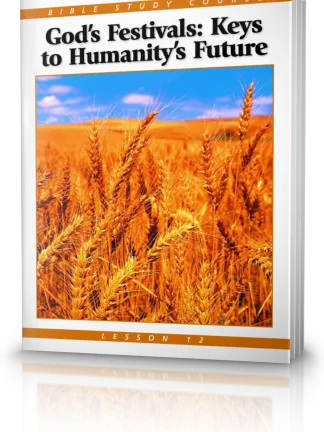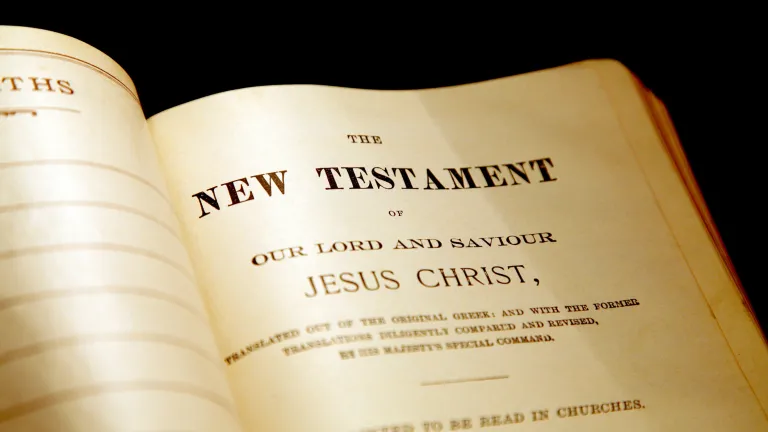What Did Paul Really Say in Colossians 2 verse 16?
The passage in Colossians 2:16, probably more than any other in the Bible, is interpreted by those who reject God's festivals as confirmation that the biblical feast days are unnecessary observances.
The apostle Paul wrote to the Colossian Christians, a gentile congregation: "Let no man therefore judge you in meat, or in drink, or in respect of an holyday, or of the new moon, or of the sabbath days: which are a shadow of things to come ..." (Colossians 2:16-17, King James Version).
This passage, probably more than any other in the Bible, is interpreted by those who reject God's festivals as confirmation that the biblical feast days are unnecessary observances. Regrettably, such reasoning is based on poor scholarship and misleading translations from the original wording of Paul's instructions.
From the context we see that Paul, in this passage, is countering a local heresy. In doing so he actually confirms and explains the value of God's days to Christians. He explains that they foreshadow "things to come."
In other words, the focus of God's festivals is on the future, relating God's plan directly to the commission Christ gave His Church. So let's examine what Paul actually says about Sabbaths, new moons and "holydays" in this verse.
First we need to understand that Paul was confronting a heresy. False teachers had infiltrated the congregation in Colosse. These deceivers had influenced the Colossian Christians by introducing their own religious philosophy. This prompted Paul to warn the Colossians, "Beware lest anyone cheat you through philosophy and empty deceit according to the tradition of men" (Colossians 2:8). Humanly devised tradition—not the revealed instructions of God's Word in the Bible—was the problem Paul was countering. Earlier Jesus had taken the Pharisees to task over the same kind of problem. They also had elevated their traditions to greater importance than God's commandments (Mark 7:8-13).
Paul tried to keep the Colossians focused on Christ as the head of the Church (Colossians 1:18; Colossians 2:10-19). But these false teachers were trying to persuade them to direct their worship toward angels (Colossians 2:18) and neglect their own bodies (Colossians 2:23). No such distorted ideas are taught anywhere in the Scriptures.
Paul characterized the Colossian heresy as "empty deceit" and "the basic principles of the world" (Colossians 2:8). The deceivers were persuading the Colossians to ignore plain biblical instruction in favor of "traditions of men."
What type of deceitful regulations did Paul combat? "Do not touch, do not taste, do not handle ... according to the commandments and doctrines of men" (Colossians 2:21-22). The heretics advocated man-made regulations concerning physical things that "perish with the using" (verse 22).
Why is this important? The deceivers were probably forerunners of a major religious movement, gnosticism, that flourished in the second century. They did not represent the mainstream Jewish thinking of that day, nor were they faithful to the Scriptures.
They believed salvation could be obtained through constant contemplation of what is "spiritual"—to, as Paul explained, the "neglect" of the physical body (Colossians 2:23). It appears they believed in various orders of angels and in direct human interaction with angels.
Paul indicates they regarded all physical things, including the human body, as decadent. He explicitly states that the heresies he was countering "concern things which perish with the using [physical things] according to the commandments and doctrines of men" (Colossians 2:22). Paul tells us he was countering human commandments and doctrines—not the commandments of God.
The Colossian heretics had introduced various man-made prohibitions—such as "Do not touch, do not taste, do not handle" (Colossians 2:21)—against the enjoyment of physical things. They especially objected to the pleasurable aspects of God's festivals—the eating and drinking aspects—that are commanded in the Scriptures (Deuteronomy 12:17-18).
When Paul wrote, "... Let no one judge you in food . . ." (Colossians 2:16), he wasn't discussing what types of foods they should or should not eat. The Greek word brosis, translated "food," refers not to the kinds of foods one should or should not eat, but to "the act of eating" (Vine's Complete Expository Dictionary of Old and New Testament Words, 1985, "Food"). The point is that the deceivers disdained feasting—any type of eating and drinking for enjoyment.
Paul instructed the Colossian Christians not to be influenced by these false teachers' objections to eating, drinking and rejoicing on Sabbaths, feast days and new moons.
Perhaps we should, at this point, mention the relationship between new moons and God's festivals. The dates for observing God's festivals are determined by a lunar calendar. Therefore new moons—which mark the beginning of the months—are important for establishing correct festival dates. Unlike God's Holy Days, however, new moons are not commanded observances in the Scriptures. In the Millennium the custom of making the arrival of each new moon a special occasion will again be restored (Isaiah 66:23), but no biblical command exists now that requires their observance.
Now back to Paul's main point: The Colossian deceivers had no authority to judge or determine how the Colossians were to observe God's festivals. That is why Paul said, "Let no man therefore judge you in meat, or in drink, or in respect of an holyday, or of the new moon, or of the sabbath days ..." (Colossians 2:16-17, King James Version).
Notice that Paul tells them to reject false human judgment, not the judgment of God found in the Scriptures.
At this point we should note another grammatical matter. The words "respect of" are translated from the Greek noun meros, which denotes a part of something. Therefore a more accurate rendering of what Paul wrote would be "Let no man therefore judge you ... in any part of a holyday, or of the new moon, or of the sabbath days ..."
Paul is simply being consistent. Eating or drinking is an appropriate part of Sabbath and feast-day observance according to the Scriptures. Therefore Paul uses meros ("part") to cover all parts or aspects of God's Holy Days that these heretics might condemn or criticize. Nothing in this passage even suggests that God abolished His Sabbaths or Holy Days, nor authorized Paul to do so. Succumbing to the judgmental influence of those early gnostic heretics is what Paul condemns, not the observance of Sabbaths and feast days.
God's festivals are times for joy and celebration. He commands us to attend them and rejoice with our children—our entire family (Deuteronomy 12:5-7; Deuteronomy 14:26). He wants us to delight in them. No wonder Paul condemns the misguided ascetic philosophy of the Colossian heretics with such vigor. Paul was defending the Christians' right to enjoy feasting at God's holy festivals.







